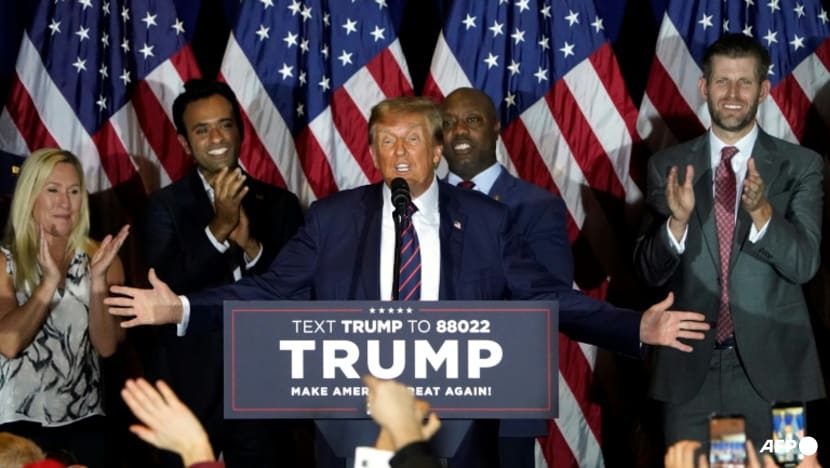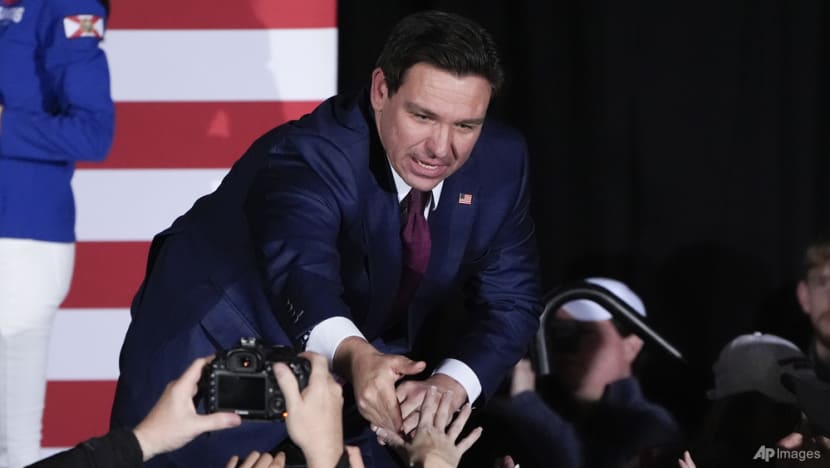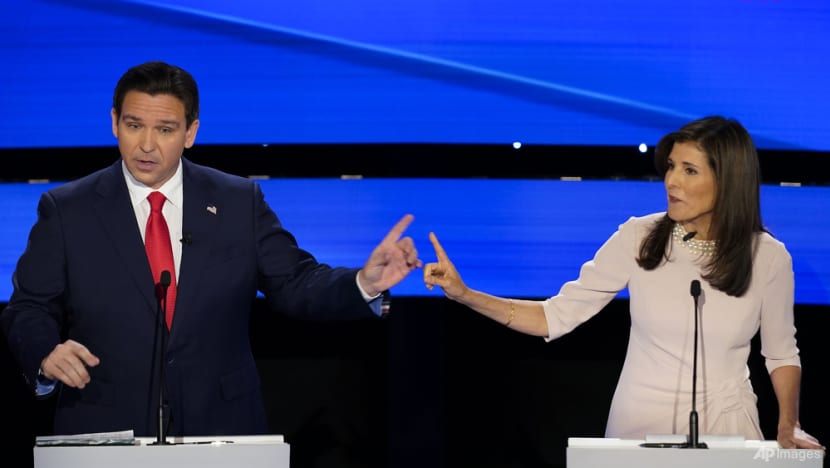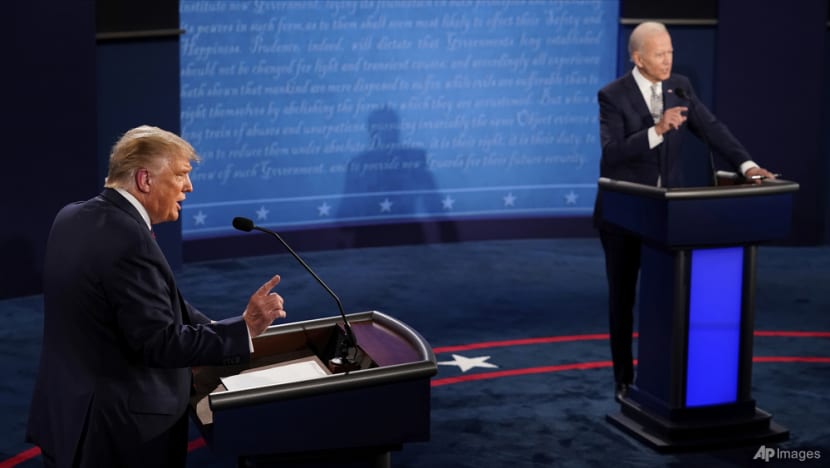Trump on track to become Republican candidate, but can surging Haley still make a dent in US presidential race?
Former president Donald Trump had won the New Hampshire Republican primary on Tuesday (Jan 23), following victory in Iowa last week.


This audio is generated by an AI tool.
Despite the likelihood of former United States president Donald Trump winning the Republican nomination for November’s presidential election, it is too early to call the outcome inevitable, said experts.
Mr Trump won the New Hampshire Republican primary on Tuesday (Jan 23), following a landslide victory in Iowa last week.
Although no Republican has ever won both opening contests and not ultimately secured the party's nomination, a one-on-one fight with former South Carolina governor Nikki Haley may yet prove an obstacle for Mr Trump, experts told CNA.
The former US ambassador to the United Nations outperformed expectations in New Hampshire.
INDEPENDENTS' IMPACT IN NEW HAMPSHIRE
The reason Ms Haley improved on her Iowa showing earlier this month, where she placed third behind Mr Trump and Florida governor Ron DeSantis, was partly due to the role of independent voters, said experts.
People who register to vote in the US have to do so as a Democrat, Republican or as an independent, explained US politics professor Brendon O'Connor, from the United States Studies Centre in the University of Sydney.
“In most states, only those who register for a particular party can get to vote in primaries, but not in New Hampshire. It prides itself on being a quirky (and) very independent state, and so independent voters get to vote,” he told CNA’s Asia Now on Wednesday.
As the Democratic primaries are a foregone conclusion with incumbent President Joe Biden as the party’s candidate, Democratic voters could change their electoral enrollment to being independent, and vote against Mr Trump and for Ms Haley in this primary, said Prof O’Connor.
“So it doesn't tell us what the feeling entirely is with Republican voters, because it's complicated by these registered independents being able to vote in New Hampshire,” he said.
Mr Richard Mullaney, executive director of Jacksonville University’s Public Policy Institute, said that of the country’s 50 states, New Hampshire is probably the one where Ms Haley can perform the best.
“There, about 40 per cent are independent. And unlike Iowa, it's less evangelical (and) less socially conservative,” he told CNA’s Asia First on Tuesday.
Supporters of Mr DeSantis, who has dropped out of the race and endorsed Mr Trump, could also likely get behind the former president, widening his lead in what is now a one-on-one contest with Ms Haley, said Mr Mullaney.
DOES HALEY STILL STAND A CHANCE?
While polls had predicted Mr Trump’s wins in Iowa and New Hampshire reasonably accurately, none of the polls suggested that Ms Haley would hit the forties range, noted Prof O'Connor.
“She's got around 44 per cent of the vote. That's, I think, exceeding expectations and certainly exceeding where people would've thought she was at a month ago. So you could argue there's some momentum with her campaign,” he said.
Yet, Mr Trump securing the Republican nomination is still not a completely forgone conclusion, said Prof O'Connor.
“It's worth remembering that four years ago, in a very competitive Democratic primary in New Hampshire, Joe Biden got 8 per cent of the vote and he was the fifth candidate,” he said.
“So the primary process can be one of twists and turns.”
Prof O’Connor said Ms Haley holds an advantage going into the next primary on Feb 24, as it will be held in her home state of South Carolina.
Ms Haley’s hopes as a candidate are still alive, particularly because of the former president’s legal troubles, he said.
Mr Trump, who was impeached twice while in the Oval Office, has four criminal trials hanging over him since leaving office.
“This may, to some extent, turn a few voters … in the Republican primaries off Donald Trump, if it seems like he's going to be convicted of a federal offence,” said Prof O’Connor.
NIKKI HALEY’S NEXT STEPS?
Mr Mullaney said that things are only going to get harder for Ms Haley against Mr Trump’s big advantage in terms of momentum and endorsements.

The anti-Trump vote which was fractured among multiple candidates has now consolidated, but it may be coming a little too late, he said.
Even heading into the next primary in her home state, Ms Haley faces an uphill task in her efforts to pull off an upset, given Mr Trump’s big lead there in the polls.
“The first thing she's going to need is donor support, and she's going to need funding for her race,” said Mr Mullaney.
“The second thing is drawing a sharper contrast with Donald Trump. There's been a lot of criticism of the candidates for not going after Donald Trump enough.”
While it is very difficult to peel votes off Mr Trump, a one-on-one fight gives Ms Haley the chance to land direct attacks on him and redefine the race, said Mr Mullaney.
“And if she could do that, it certainly would be more competitive heading into Super Tuesday. I will say this, while the odds are against her, we've seen strange things in politics,” he added.

Super Tuesday is a day in March when the greatest number of US states hold their primaries and caucuses, with approximately one-third of all delegates up for grabs.
This year’s Super Tuesday would see Alabama, Arkansas, Alaska, California, Colorado, Iowa, Maine, Massachusetts, Minnesota, North Carolina, Oklahoma, Tennessee, Texas, Utah, Vermont and Virginia, hold polls.
CAN BIDEN DEFEAT TRUMP AGAIN?
In her speech after the New Hampshire results, Ms Haley said that Democrats actually want to run against Mr Trump due to his record of sowing "chaos".
The Democrats also view Mr Trump as the only Republican in the country who President Biden can defeat come November, she had added.
Prof O’Connor said past evidence indeed points to that, as Mr Biden did “reasonably sort of handsomely defeat Donald Trump” back in the 2020 contest, though he noted that things are a bit tighter this time round.

However, the odds are historically stacked against Mr Trump, he said.
“It's very uncommon in American politics that a loser gets to fight against a candidate that's already beaten them,” he said, adding that the last time this occurred was in 1956 with Dwight D. Eisenhower and Adlai Stevenson II.
“Usually in most Democratic systems, once you lose, you're kind of gone.”
While former president Richard Nixon was defeated in 1960 but re-elected again in 1968, it was against a different candidate, a much weaker Hubert Humphrey rather than John F. Kennedy, said Prof O’Connor.
“Trump has an enormous ego. His belief in himself (and) his lies about the election being stolen from him have been all part of his attempt to have a comeback,” he said.
“But we only have one US president who was defeated in an election after being president, and came back. That was in the 19th century with Grover Cleveland.”
Former president Cleveland had won the election in 1884, then lost in 1888, before winning and returning to office again in 1892.
“But with Trump we know from history (that) many predictions by people like myself, we've got to be cautious about them, because he has rewritten many of the sort of rule books,” said Prof O’Connor.
There is also a sense that Mr Biden has “certain strengths in the key states that Trump would need to win to beat him in this election”, he added.
While there are some candidates from the Democratic party looking to challenge Mr Biden, Prof O’Connor said they are not “serious contenders”.
“I think the bigger issue is his popularity in general in the United States is not particularly strong,” he said.
Mr Biden is in a weak position in terms of historical trends and approval ratings, as many feel he has not done enough to curb inflation and that interest rates in the country are still quite high.














